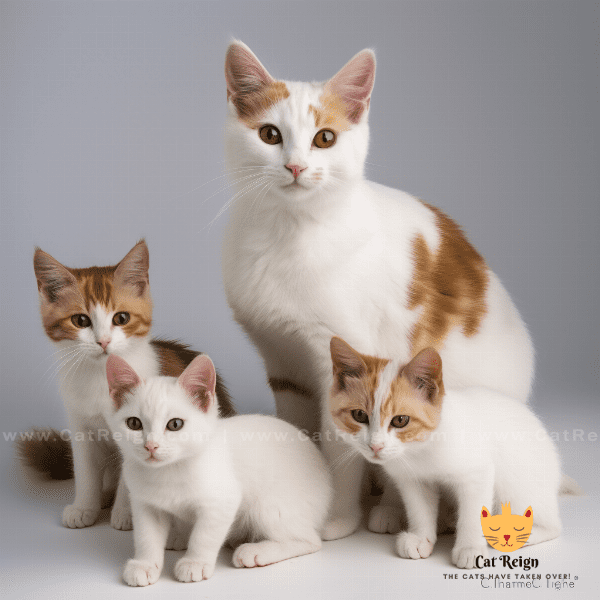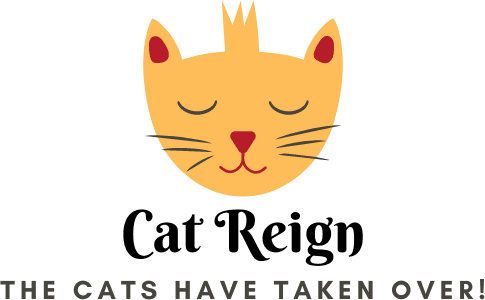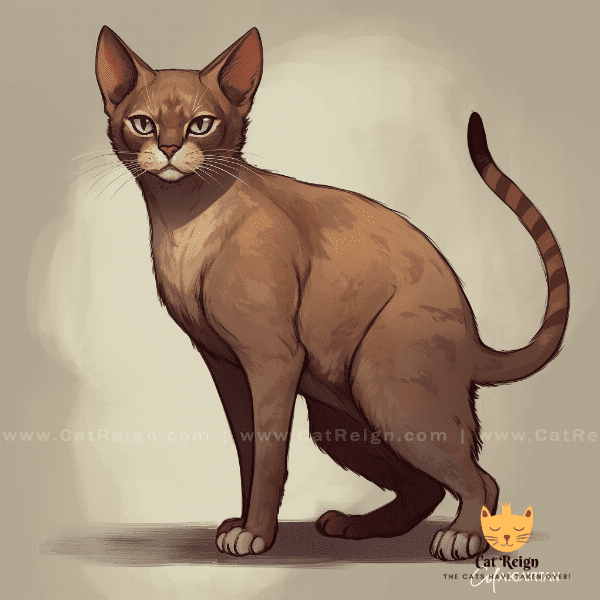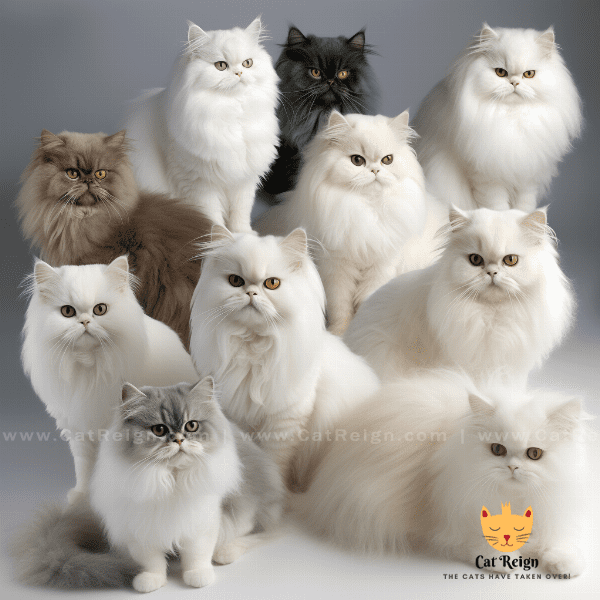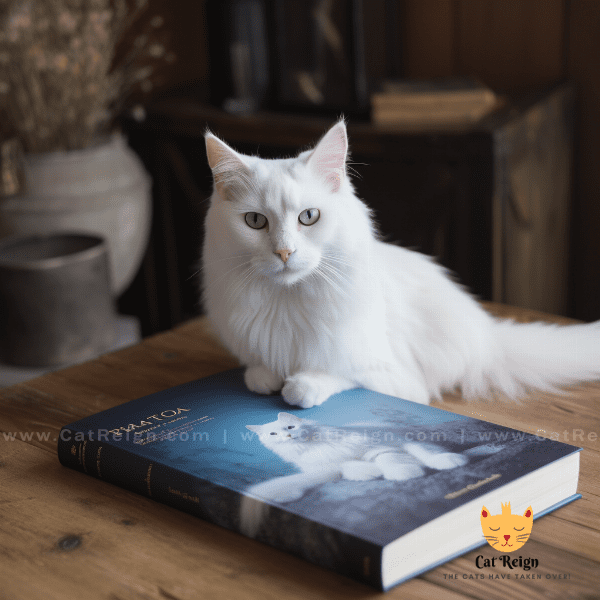Table of Contents
- Origins and History of Turkish Van Cat
- Physical Characteristics and Appearance of Turkish Van Cat
- Personality and Temperament of Turkish Van Cat
- Grooming and Care for Turkish Van Cat
- Health Issues and Common Concerns for Turkish Van Cat Owners
- Turkish Van Cat’s Dietary Requirements and Nutrition
- Exercise and Training for Turkish Van Cat
- Living with Turkish Van Cat: Tips for Owners
- Turkish Van Cat’s Relationship with Children and Other Pets
- Breeding and Future of Turkish Van Cat Breed
Origins and History of Turkish Van Cat
The Turkish Van Cat is a naturally occurring breed that originated in the Lake Van region of Turkey. It is believed that the breed has been around for over a thousand years and was first brought to Europe in the 16th century by merchants and traders.
The Legend of the Turkish Van Cat
According to legend, the Turkish Van Cat was created when two cats were left behind on the shores of Lake Van. One was white and the other was black, and they mated to produce a litter of kittens that had a unique combination of both colors. These kittens were the first Turkish Van Cats.
Recognition as a Breed
The Turkish Van Cat was first recognized as a breed in the United Kingdom in the 1950s. It wasn’t until the 1970s that the breed was imported to the United States, where it gained popularity among cat fanciers. Today, the Turkish Van Cat is recognized by most major cat organizations and is a popular breed worldwide.
Characteristics of the Breed
The Turkish Van Cat is a medium to large-sized cat with a muscular build and a distinctive coat pattern. The breed is known for its love of water and is often called the “swimming cat”. The coat of the Turkish Van Cat is semi-long and silky, and is typically white with patches of color on the head and tail.
About Turkish Van Cat’s Name
The breed is named after its place of origin, Lake Van, and the Turkish word “Van”, which means “of” or “from Van”. This is why the breed is commonly referred to as the Turkish Van Cat.
Conclusion
In conclusion, the Turkish Van Cat is a unique breed with a fascinating history. It has become a popular breed worldwide due to its distinctive appearance, affectionate nature, and love of water. Whether you are a cat lover or not, there is no denying the appeal of the Turkish Van Cat.
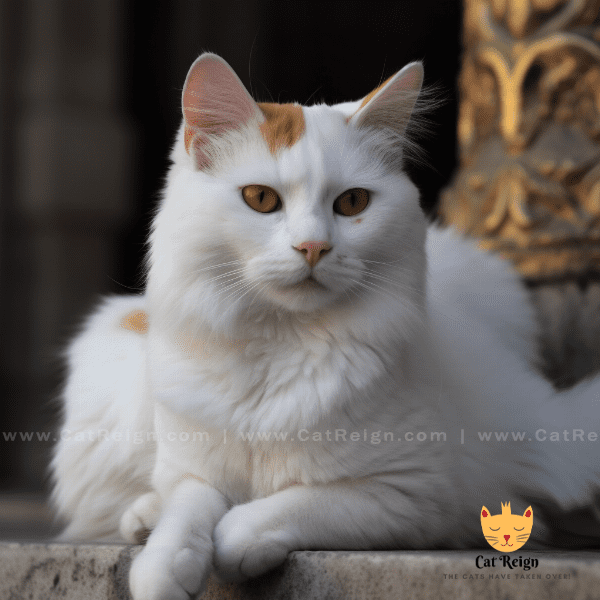
Physical Characteristics and Appearance of Turkish Van Cat
The Turkish Van Cat is a medium to large-sized cat with a distinctive appearance. The breed has a muscular build and a broad chest. Their hind legs are slightly longer than their front legs, which gives them a unique gait.
Coat and Color
The Turkish Van Cat’s coat is semi-long and silky, with a distinctive pattern. The most common color for the breed is white, with colored markings on the head and tail. The colored markings can be black, red, cream, or a combination of these colors.
Eyes
The breed’s eyes are large and almond-shaped, and they are usually blue or amber in color. Some cats may have odd-colored eyes, with one eye being blue and the other being amber.
Ears
The ears of the Turkish Van Cat are medium-sized and rounded at the tips. They are set high on the head and are slightly tilted forward.
Tail
The breed’s tail is thick and plumed, with fur that is longer than the rest of the body. The tail is often colored to match the markings on the head.
About Turkish Van Cat’s Swimming Ability
One of the most unique physical characteristics of the Turkish Van Cat is its love of water. This breed is an excellent swimmer and is often referred to as the “swimming cat”. They have been known to swim in pools, lakes, and even the ocean.
Conclusion
In conclusion, the Turkish Van Cat is a medium to large-sized cat with a distinctive appearance. The breed’s semi-long, silky coat and broad chest give it a muscular and powerful look. The Turkish Van Cat’s love of water and unique gait are some of the breed’s most notable physical characteristics. Whether you are a cat lover or not, the Turkish Van Cat’s unique appearance and swimming ability are sure to capture your attention.
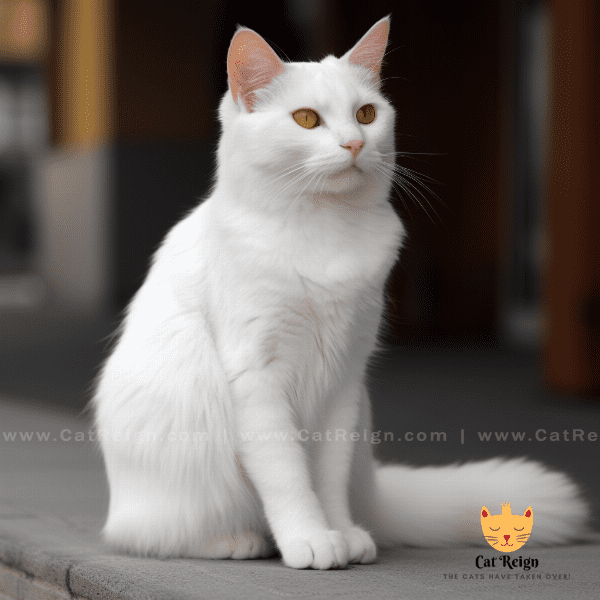
Personality and Temperament of Turkish Van Cat
The Turkish Van Cat is known for its affectionate and playful personality. This breed is highly intelligent, and they love to interact with their owners.
Affectionate and Playful
The Turkish Van Cat is a breed that thrives on attention and loves to be around people. They are known for their affectionate nature and will often follow their owners around the house. They also have a playful side, and they enjoy playing with toys and games that stimulate their intelligence.
Independent and Curious
Despite their affectionate nature, the Turkish Van Cat is an independent breed. They enjoy spending time alone and are perfectly content entertaining themselves. However, they are also very curious and will explore their surroundings with great interest.
Vocal and Communicative
The Turkish Van Cat is a vocal breed and will often communicate with their owners through meows and other vocalizations. They are also very expressive and will use body language to convey their mood and emotions.
Loyal and Protective
The Turkish Van Cat is a loyal breed that will form strong bonds with their owners. They are also known to be protective of their owners and will defend them if they feel that they are in danger.
About Turkish Van Cat’s Playfulness
One of the most endearing traits of the Turkish Van Cat is their playfulness. They love to play with toys and games that stimulate their intelligence, and they enjoy spending time with their owners. This playful nature makes them a great choice for families with children or other pets.
Conclusion
In conclusion, the Turkish Van Cat is an affectionate and playful breed that loves to interact with their owners. They are independent, curious, and vocal, and they will form strong bonds with their owners. Their playful nature and intelligence make them a great choice for families, and their loyalty and protective nature make them excellent companions. Whether you are a cat lover or not, the Turkish Van Cat’s unique personality and temperament are sure to win you over.
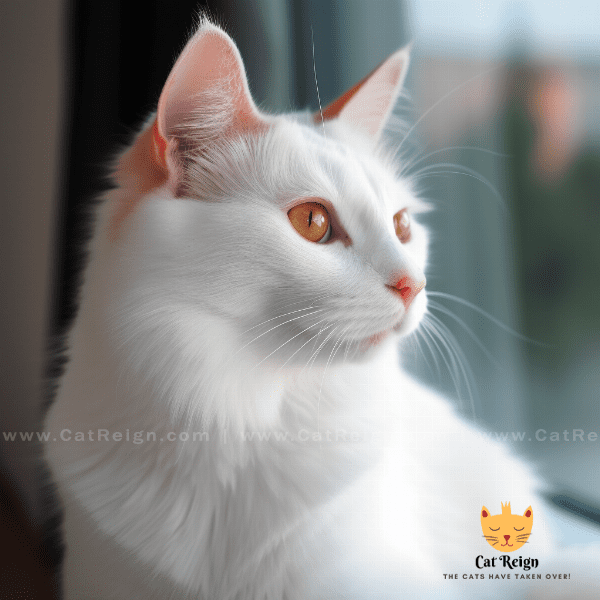
Grooming and Care for Turkish Van Cat
Brushing and Bathing
The Turkish Van Cat’s coat should be brushed at least once a week to remove any loose or dead hair. This will also help prevent matting and tangling. In addition, the breed’s love of water means that they enjoy taking baths. Giving your Turkish Van Cat a bath once a month will help keep their coat clean and shiny.
Nail Care
It is important to trim your Turkish Van Cat’s nails regularly to prevent them from becoming too long and causing discomfort. You can use a pair of cat nail clippers to trim their nails, but be careful not to cut them too short.
Dental Care
Like all cats, the Turkish Van Cat needs regular dental care to prevent dental issues such as periodontal disease. You can keep their teeth clean by brushing them regularly with a cat toothbrush and toothpaste.
Nutrition
The Turkish Van Cat requires a balanced diet that is rich in protein and nutrients. It is important to feed your cat high-quality cat food that is appropriate for their age, weight, and activity level.
About Turkish Van Cat’s Coat
The Turkish Van Cat’s semi-long, silky coat requires regular grooming to keep it looking healthy and beautiful. Their coat is also water-resistant, which makes it perfect for their love of water.
Conclusion
In conclusion, the Turkish Van Cat requires regular grooming and care to keep them healthy and happy. Brushing their coat, trimming their nails, and cleaning their teeth are all important aspects of caring for your Turkish Van Cat. In addition, feeding them a balanced diet and providing them with plenty of love and attention will ensure that they thrive. Whether you are a cat lover or not, the Turkish Van Cat’s unique coat and grooming requirements make them a fascinating breed to care for.
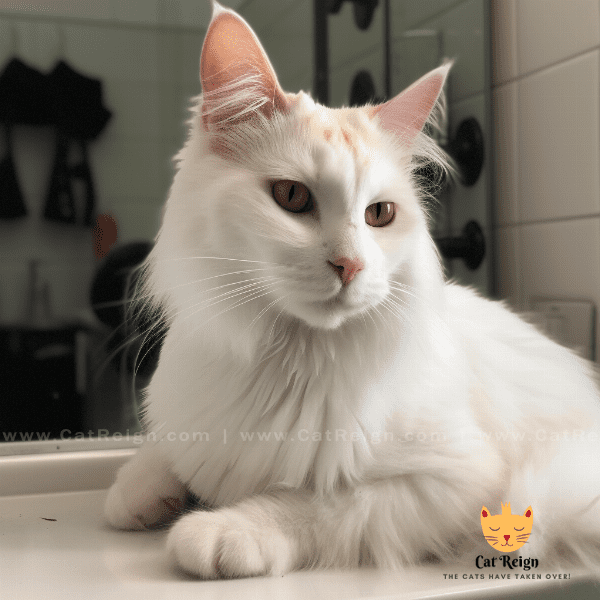
Health Issues and Common Concerns for Turkish Van Cat Owners
The Turkish Van Cat is generally a healthy breed, but like all cats, they are susceptible to certain health issues. Here are some of the most common health concerns that Turkish Van Cat owners should be aware of.
Hypertrophic Cardiomyopathy
Hypertrophic cardiomyopathy (HCM) is a heart condition that is common in many Cat breeds, including the Turkish Van Cat. HCM causes the walls of the heart to thicken, which can lead to heart failure. Regular check-ups with a veterinarian can help catch this condition early.
Polycystic Kidney Disease
Polycystic kidney disease (PKD) is a genetic condition that affects the kidneys. It causes the growth of cysts on the kidneys, which can eventually lead to kidney failure. Breeding programs have worked to reduce the incidence of PKD in the Turkish Van Cat population.
Deafness
The Turkish Van Cat is prone to deafness, particularly in cats with a predominantly white coat. This is because the gene that causes white fur is linked to deafness. If you suspect that your cat may be deaf, a veterinarian can perform a hearing test.
Obesity
The Turkish Van Cat is an active breed that loves to play and explore, but they are also prone to obesity. It is important to monitor your cat’s diet and provide them with plenty of exercise to help maintain a healthy weight.
About Turkish Van Cat’s Health
While the Turkish Van Cat is generally a healthy breed, they are susceptible to certain health issues. Regular check-ups with a veterinarian and a healthy diet and exercise regimen can help prevent and manage these health concerns.
Conclusion
In conclusion, the Turkish Van Cat is a generally healthy breed that is prone to certain health issues. Hypertrophic cardiomyopathy, polycystic kidney disease, deafness, and obesity are all concerns that Turkish Van Cat owners should be aware of. Regular check-ups with a veterinarian, a healthy diet, and plenty of exercise can help keep your Turkish Van Cat healthy and happy for years to come. Whether you are a cat lover or not, the health concerns of the Turkish Van Cat make them an important breed to understand and care for.
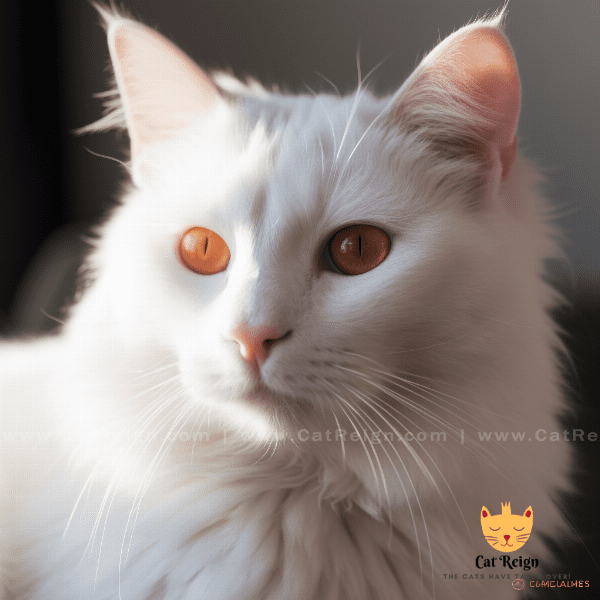
Turkish Van Cat’s Dietary Requirements and Nutrition
The Turkish Van Cat requires a balanced and nutritious diet to maintain good health. Here are some important factors to consider when feeding your Turkish Van Cat.
Protein and Nutrient Requirements
The Turkish Van Cat requires a diet that is rich in protein and essential nutrients, such as vitamins and minerals. Look for cat food that is specifically formulated for the nutritional needs of the breed.
Feeding Schedule
The Turkish Van Cat should be fed small, frequent meals throughout the day to help maintain a healthy weight. Avoid overfeeding, as the breed is prone to obesity.
Water Intake
The Turkish Van Cat is known for its love of water, and they require plenty of fresh water to stay hydrated. Consider providing your cat with a water fountain to encourage them to drink more water.
Treats
Treats should be given in moderation to the Turkish Van Cat, as they can quickly add to their calorie intake. Look for healthy treats that are specifically formulated for cats.
About Turkish Van Cat’s Dietary Habits
The Turkish Van Cat is a breed that requires a balanced and nutritious diet to maintain good health. Their love of water means that they require plenty of fresh water to stay hydrated, and small, frequent meals throughout the day can help them maintain a healthy weight.
Conclusion
In conclusion, the Turkish Van Cat requires a diet that is rich in protein and essential nutrients to maintain good health. Feeding small, frequent meals throughout the day and providing plenty of fresh water can help the breed maintain a healthy weight and stay hydrated. Treats should be given in moderation, and it is important to choose healthy options that are specifically formulated for cats. Whether you are a cat lover or not, understanding the dietary requirements of the Turkish Van Cat is important for their overall health and well-being.
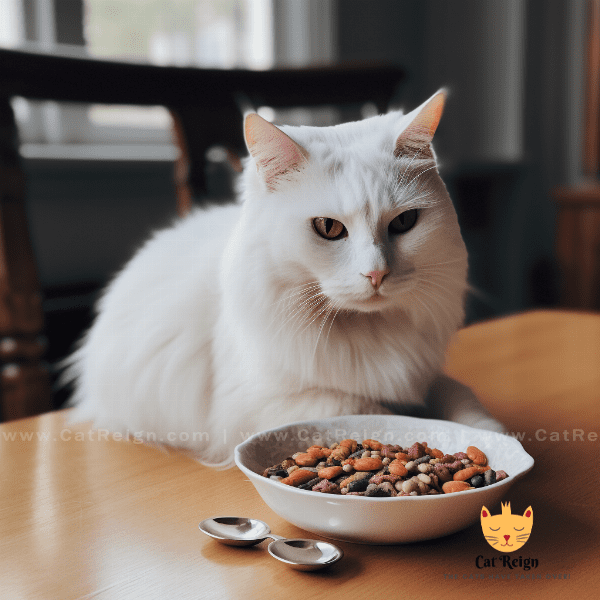
Exercise and Training for Turkish Van Cat
The Turkish Van Cat is an active breed that requires regular exercise and mental stimulation to stay healthy and happy. Here are some tips for exercising and training your Turkish Van Cat.
Interactive Toys
Interactive toys, such as puzzle feeders, can help provide mental stimulation for the Turkish Van Cat. These toys require the cat to use their problem-solving skills to get to the treats inside.
Training
While the Turkish Van Cat is an intelligent breed, they can be difficult to train. Positive reinforcement training techniques, such as clicker training, can be effective in teaching your cat basic commands and tricks.
Outdoor Access
The Turkish Van Cat loves to explore their surroundings, and they can benefit from having access to the outdoors. However, it is important to supervise your cat when they are outside to ensure their safety.
Conclusion
In conclusion, the Turkish Van Cat is an active breed that requires regular exercise and mental stimulation to stay healthy and happy. Playtime, interactive toys, training, and outdoor access can all help provide the necessary activity level for the breed. Whether you are a cat lover or not, understanding the exercise and training requirements of the Turkish Van Cat is important for their overall health and well-being.
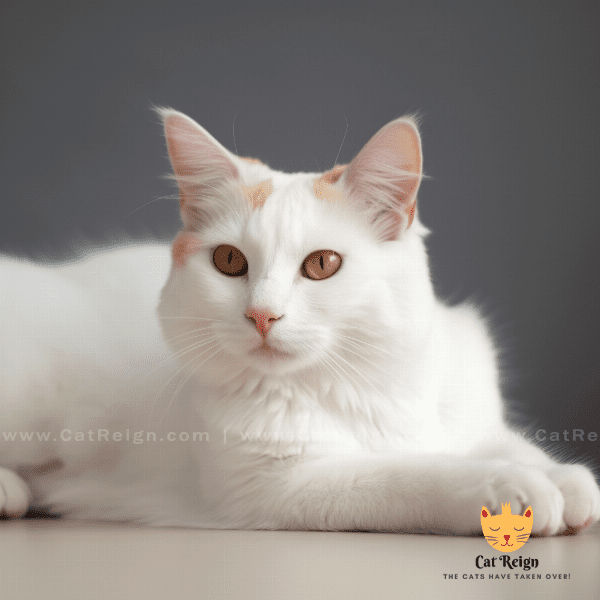
Living with Turkish Van Cat: Tips for Owners
The Turkish Van Cat is a unique and fascinating breed that requires a special kind of care and attention. Here are some tips for living with a Turkish Van Cat.
Provide Plenty of Attention
The Turkish Van Cat is an affectionate breed that loves to be around people. Providing your cat with plenty of attention and affection can help strengthen your bond and keep them happy and healthy.
Grooming and Care
The Turkish Van Cat’s semi-long, silky coat requires regular grooming to keep it looking healthy and beautiful. In addition, the breed requires regular nail trimming and dental care to maintain good health.
Exercise and Playtime
The Turkish Van Cat is an active breed that requires regular exercise and playtime to stay healthy and happy. Providing your cat with plenty of toys and interactive games can help keep them entertained and stimulated.
Supervise Outdoor Access
While the Turkish Van Cat loves to explore their surroundings, it is important to supervise their outdoor access to ensure their safety. Consider providing your cat with a secure outdoor enclosure to allow them to enjoy the outdoors safely.
About Turkish Van Cat’s Temperament
The Turkish Van Cat is an affectionate and playful breed that loves to be around people. Regular grooming and care, exercise and playtime, and supervised outdoor access can help ensure that the breed is healthy and happy.
Conclusion
In conclusion, living with a Turkish Van Cat requires a special kind of care and attention. Providing your cat with plenty of attention and affection, grooming and care, exercise and playtime, and supervised outdoor access can all help keep the breed healthy and happy. Whether you are a cat lover or not, understanding the unique temperament and care requirements of the Turkish Van Cat is important for providing them with a happy and fulfilling life.
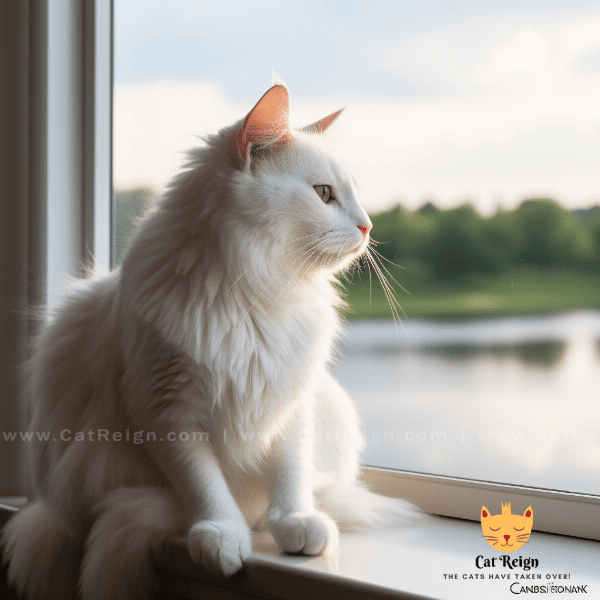
Turkish Van Cat’s Relationship with Children and Other Pets
Introducing to Children
When introducing your Turkish Van Cat to children, it is important to supervise the interaction and teach the children how to handle the cat gently. Encouraging the children to play with the cat using toys can help strengthen their bond and keep both the cat and child happy.
Introducing to Other Pets
The Turkish Van Cat is generally friendly towards other pets, but it is important to supervise the introduction and give them time to adjust to each other’s presence. Providing separate spaces for each pet can help prevent conflicts and ensure that everyone feels comfortable.
About Turkish Van Cat’s Personality
The Turkish Van Cat is known for its affectionate and playful personality, which makes them a great companion for children and other pets. With proper introduction and supervision, the breed can form strong bonds with people and other animals.
Conclusion
In conclusion, the Turkish Van Cat is a great companion for children and other pets due to their affectionate and playful personality. Proper introduction and supervision are important when introducing the breed to children and other pets. Understanding the unique personality and temperament of the Turkish Van Cat can help ensure that they form strong bonds with people and other animals. Whether you are a cat lover or not, the Turkish Van Cat’s friendly nature makes them a great addition to any family.
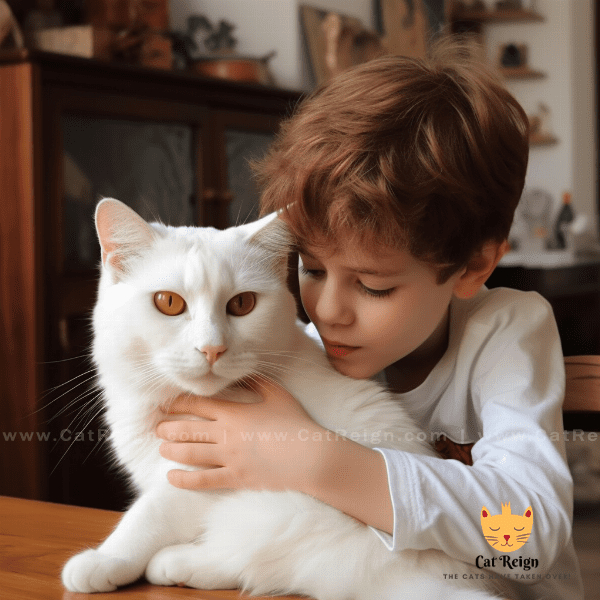
Breeding and Future of Turkish Van Cat Breed
The Turkish Van Cat is a rare and unique breed that is highly prized for its distinctive markings and friendly personality. Here are some important things to consider when breeding the Turkish Van Cat.
Breeding Programs
Breeding programs have worked to preserve the Turkish Van Cat’s unique qualities and reduce the incidence of certain genetic health conditions, such as polycystic kidney disease. Responsible breeders should be knowledgeable about the breed’s health concerns and work to produce healthy, well-socialized kittens.
Future of the Breed
The future of the Turkish Van Cat breed is bright, as the breed’s popularity continues to grow. However, it is important for breeders and owners to continue to prioritize the breed’s health and welfare to ensure that they continue to thrive.
Adopting a Turkish Van Cat
If you are interested in adopting a Turkish Van Cat, it is important to work with a reputable breeder or rescue organization. Adopting a cat from a rescue can be a great way to give a cat in need a loving home.
About Turkish Van Cat Breeding
Breeding programs have worked to preserve the unique qualities of the Turkish Van Cat and reduce the incidence of certain genetic health conditions. The future of the breed is bright, but it is important for breeders and owners to continue to prioritize the breed’s health and welfare.
Conclusion
In conclusion, the Turkish Van Cat is a rare and unique breed that is highly prized for its distinctive markings and friendly personality. Responsible breeding programs and adoption efforts can help ensure that the breed continues to thrive for years to come. Whether you are a cat lover or not, understanding the breeding and future of the Turkish Van Cat breed is important for the preservation and well-being of this beloved breed.
